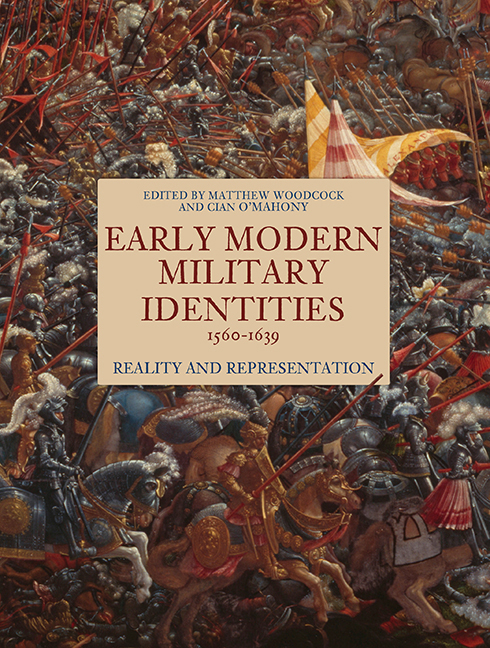Book contents
- Frontmatter
- Contents
- List of Illustrations
- List of Contributors
- Acknowledgments
- List of Abbreviations
- Introduction
- Part I Models of Military Identity
- Part II Military Identities in Early odern Ireland
- Part III Staging Military Identities
- 10 Othello and the Braggart Soldier in the Context of Elizabethan War Veterans
- 11 ‘Lay by thine Arms and take the Citie then’: Soldiery and City in the Drama of Thomas Middleton
- 12 ‘Sometimes a figure, sometimes a cipher’: Dramatic Assertions of Martial Identity, 1580-1642
- Afterword: The Way Ahead
- Bibliography
- Index
10 - Othello and the Braggart Soldier in the Context of Elizabethan War Veterans
from Part III - Staging Military Identities
Published online by Cambridge University Press: 14 September 2019
- Frontmatter
- Contents
- List of Illustrations
- List of Contributors
- Acknowledgments
- List of Abbreviations
- Introduction
- Part I Models of Military Identity
- Part II Military Identities in Early odern Ireland
- Part III Staging Military Identities
- 10 Othello and the Braggart Soldier in the Context of Elizabethan War Veterans
- 11 ‘Lay by thine Arms and take the Citie then’: Soldiery and City in the Drama of Thomas Middleton
- 12 ‘Sometimes a figure, sometimes a cipher’: Dramatic Assertions of Martial Identity, 1580-1642
- Afterword: The Way Ahead
- Bibliography
- Index
Summary
It was not the reputation of a famous leader in the wars which he sought (as it was construed a great while) but only power and greatness to serve his own ends, considering he never loved virtue nor valor in another, but where he thought he should be proprietary and commander of it, as referred to himself.
Francis Bacon on the earl of EssexCritics have long noted Othello's connection to the miles gloriosus or ‘braggart soldier’ of classical comedy and Italian commedia dell'arte, but on what to make of this connection there is little agreement. Thomas Rymer commented in the late seventeenth century that Othello's ‘love and his jealousy are no part of a soldier's character, unless for comedy’. But Othello is not a comedy or, if it is a comedy, it is not a very funny one. Rymer called the play a ‘bloody farce’ but ‘without salt or savour’, and recent critics have found the lack of salt and savour sufficient reason to question its connections to the braggart soldier tradition. Kenneth Muir suggests the comic echoes are misleading. ‘Far from being a braggart soldier, Othello is modest in his claims’, Muir contends, and ‘his frequent expressions of self-esteem would be regarded by Shakespeare's audience, not as vanity, but as legitimate and proper pride’. Other critics have found the comic echoes to amplify Othello's tragic force. The shadow of the comic braggart creates a ‘strange and contradictory experience’, in Teresa J. Faherty's reading. As Othello's noble facade erodes, the features he shares with the braggart soldier – his bullying and misogyny – become ‘newly disturbing’. Stephen Rogers contends that ‘Othello is not the miles gloriosus. But the music of his utterance and the splendor of his nobility are reduced to the solemn and pathetic counterparts of the comic soldier's vanities.’
The comedic echoes in Othello are less confusing, however, when both the play and the braggart soldier are viewed in the context of the discourses on Elizabethan veterans.
- Type
- Chapter
- Information
- Early Modern Military Identities, 1560–1639Reality and Representation, pp. 221 - 234Publisher: Boydell & BrewerPrint publication year: 2019



